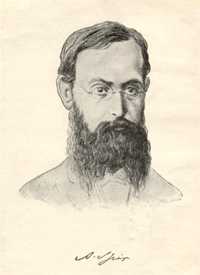Words of a Sage : Selected thoughts of African Spir (1937)
African Spir Citations
African Spir: Citations en anglais
Source: Words of a Sage : Selected thoughts of African Spir (1937), p. 60.
Source: Words of a Sage : Selected thoughts of African Spir (1937), p. 43.
“It depends on ourselves to be to each others, either a blessing or a torment.”
Source: Words of a Sage : Selected thoughts of African Spir (1937), p. 37.
"jouissance", Fr.
Source: Words of a Sage : Selected thoughts of African Spir (1937), p. 48 - Gandhi wrote something that is almost word for word the same, in All men are brothers.
Source: Words of a Sage : Selected thoughts of African Spir (1937), p. 50.
or collapse, or failed
Source: Words of a Sage : Selected thoughts of African Spir (1937), p. 41.
Source: Words of a Sage : Selected thoughts of African Spir (1937), p. 52.
Source: Words of a Sage : Selected thoughts of African Spir (1937), p. 38.
Source: Words of a Sage : Selected thoughts of African Spir (1937), p. 60.
Source: Words of a Sage : Selected thoughts of African Spir (1937), p. 38 ["… moral consciousness is an innate and intimate revelation of the absolute, which exceed every empirical data..." - see above].
Source: Words of a Sage : Selected thoughts of African Spir (1937), p. 45.
Source: Words of a Sage : Selected thoughts of African Spir (1937), p. 52.
Source: Words of a Sage : Selected thoughts of African Spir (1937), pp. 64-65 - end of parenthesis.
Source: Words of a Sage : Selected thoughts of African Spir (1937), p. 55.
Source: Words of a Sage : Selected thoughts of African Spir (1937), p. 43.
Source: Words of a Sage : Selected thoughts of African Spir (1937), p. 56.
Source: Words of a Sage : Selected thoughts of African Spir (1937), p. 54.
Source: Words of a Sage : Selected thoughts of African Spir (1937), p. 60.
Source: Words of a Sage : Selected thoughts of African Spir (1937), p. 51.
"Le concept de l'absolu, d'où découlent, dans le domaine moral, les lois ou normes morales, constitue, le principe d'identité, qui est la loi fondamentale de la pensée; il en découle les normes logiques qui régissent la pensée dans le domaine de la science."
Source: Words of a Sage : Selected thoughts of African Spir (1937), p. 59 [Hélène Claparède-Spir had underlined - the translator]
Source: Words of a Sage : Selected thoughts of African Spir (1937), p. 49.
Source: Words of a Sage : Selected thoughts of African Spir (1937), p. 61.
Source: Words of a Sage : Selected thoughts of African Spir (1937), p. 40.
Source: Words of a Sage : Selected thoughts of African Spir (1937), p. 48.
Source: Words of a Sage : Selected thoughts of African Spir (1937), p. 48.
Source: Words of a Sage : Selected thoughts of African Spir (1937), p. 42.
Source: Words of a Sage : Selected thoughts of African Spir (1937), p. 41.
Source: Words of a Sage : Selected thoughts of African Spir (1937), p. 51.
“The moral improvement demands an evolution leading to a higher consciousness”
Source: Words of a Sage : Selected thoughts of African Spir (1937), p. 60 - Hélène's Claparède-Spir underlined.
Source: Words of a Sage : Selected thoughts of African Spir (1937), p. 37.
